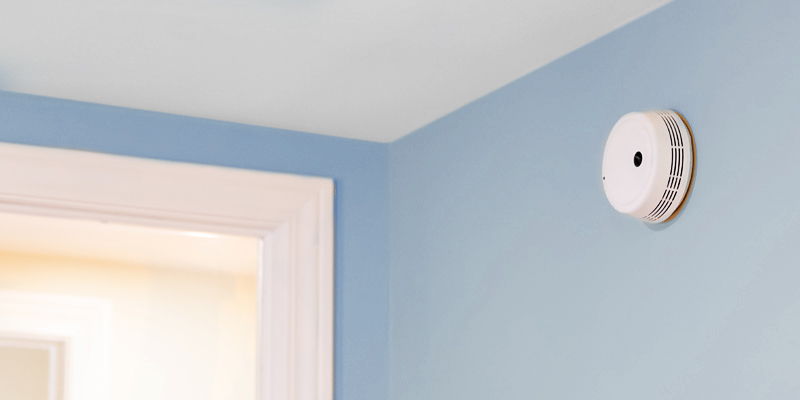How Many Smoke Detectors Do I Need?

Smoke detectors could save the lives of you and your family in the event of a fire. They are perhaps the most important electronic devices in your home.
A fire in your home can spread quickly, and smoke detectors can help ensure that you’re able to evacuate safely. That’s why it’s critical to install and maintain an adequate number of working smoke detectors in your home.
But how many smoke detectors do you need in your home in order to keep your family safe?
The number depends on the size of your home. For instance, a one-bedroom apartment will need fewer alarms than an eight-bedroom home.
To figure out how many you need, let’s look at all the areas of a home that should have one …
Where Are Smoke Detectors Required in a Home?
When there’s a fire in your home, your family has just minutes to escape. To get the earliest warning, the National Fire Protection Association (NFPA) recommends installing smoke detectors in the following areas of your home:
- Inside every bedroom
- Outside every sleeping area
- On every story of a house (including the basement)
So, if you live in a 3-bedroom ranch with a basement, depending on your layout, you should have a smoke detector in each bedroom, one in the hallway where the bedrooms are clustered, one in the basement, and one in the attic. Additionally, you should have carbon monoxide alarms (combination smoke-carbon monoxide alarms are popular purchases) above fuel-burning appliances (water heaters, furnaces, gas stoves, clothes dryers, etc.) and outside of sleeping areas. We also recommend having a smoke, heat and/or carbon monoxide alarm in the garage. That adds up to at least seven, if you were to employ dedicated CO alarms separately.
A two-story 4-bedroom home would need at least two more—one for the additional bedroom and one for the downstairs living area (where there are no bedrooms).
Check out this interactive graphic for a good visual representation of where smoke alarms, extinguishers, and CO alarms should be placed in a home.
Additional NFPA recommendations on where and how to place smoke detectors:
- Since smoke rises, the NFPA recommends installing smoke detectors on ceilings or on walls not more than 12 inches below the ceiling.
- On levels without bedrooms, install smoke detectors in the living room, den or family room or near the stairway to the upper level.
- Smoke alarms installed in basements should be situated on the ceiling at the bottom of the stairs.
- Avoid installing smoke detectors within 10 feet of a cooking appliance to minimize false alarms.
- If you have pitched ceilings, place the alarms within three feet of the peak, but at least four inches below the peak, because smoke might not collect at the very apex of pitch.
- Do not place smoke alarms near places where there is a breeze that could interfere with the alarm’s sensors picking up smoke, such as near windows, doors, or ducts/registers.
Which Type of Smoke Detector to Install in Your Home
There are a many different types of smoke alarms, but the two most common are ionization and photoelectric smoke detectors. Understanding the difference between these two technologies will help you determine which type of smoke detector to install in your home.
- Ionization-type alarms have a small quantity of radioactive material between two electrically charged plates, called electrodes. When this material ionizes the air, it causes current to flow between the two electrodes. During a fire, smoke entering the chamber disrupts the flow of ions between the electrodes, setting off the alarm. Ionization smoke detectors are typically more responsive to flaming fires.
- Photoelectric-type alarms use a beam of LED light to detect smoke during a fire. As smoke particles from a fire hit the LED beams, the sensor detects a break in the beam and is activated. Photoelectric alarms are typically better at detecting smoldering fires.
Because you won’t ever be able to predict whether a fire in your home will be a flaming fire or a smoldering fire, the NFPA recommends using both types of alarms for best protection. Many manufacturers make alarms with dual sensors. The other option is to use a combination of ionization and photoelectric smoke alarms.
At Aire Serv, we also like to also remind customers that having carbon monoxide (CO) detectors is vital for family safety. Many smoke alarm manufacturers sell alarms that combine smoke detection with CO detection. These are often called combination smoke-CO alarms.
When you’ve selected your mix of smoke detectors, the NFPA recommends interconnecting them. Interconnected smoke alarms have a higher success rate of alerting occupants of a fire. The NFPA recommends that your mix of alarms all be made by the same manufacturer (the same brand) if your plan is to interconnect them.
Maintaining Your Smoke Detectors
No matter what mix of smoke alarm types you choose to install, and whether they are interconnected, bear in mind that maintaining your smoke detectors is just as important as installing them.
Regularly maintain your smoke and CO alarms according to manufacturer’s instructions.
In general, here are a few general ways you can maintain your home’s smoke detectors and ensure you’re prepared for a fire or carbon monoxide leak (your detectors’ specific maintenance instructions may vary):
- Use the test button to test smoke and CO alarms at least once per month.
- Replace smoke detector batteries (twice per year, or when the alarm chirps).
- Make sure everyone in your home is familiar with the sound of the alarm.
- Replace smoke detectors every eight to ten years and combination smoke-CO alarms every five to seven years.
A smoke detector only works to keep you safe if it is well maintained, so taking the necessary measures to assure your alarms are ready to alert you when there is a fire.
To rest assured that your home is safe and prepared for an emergency, call Aire Serv® at for professional smoke detector and carbon monoxide detector installation and maintenance. Give yourself peace of mind and request an appointment with one of our expert technicians to keep your family safe and healthy.
 Click to call
Click to call


